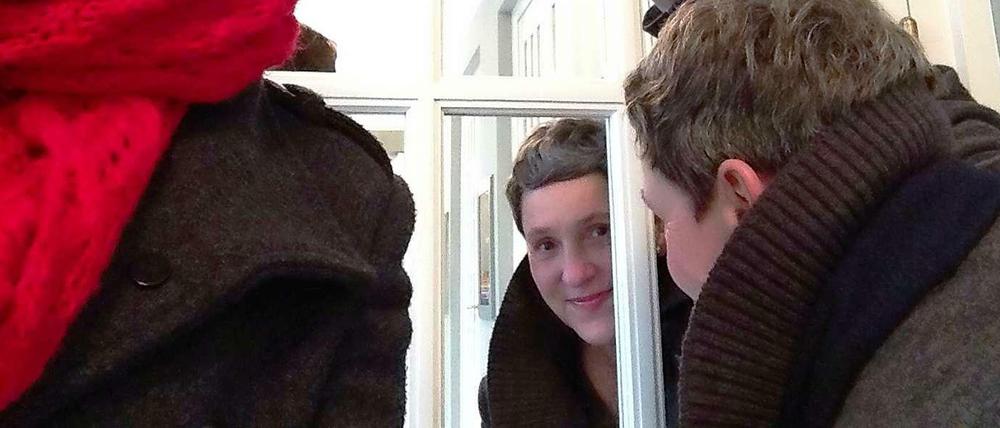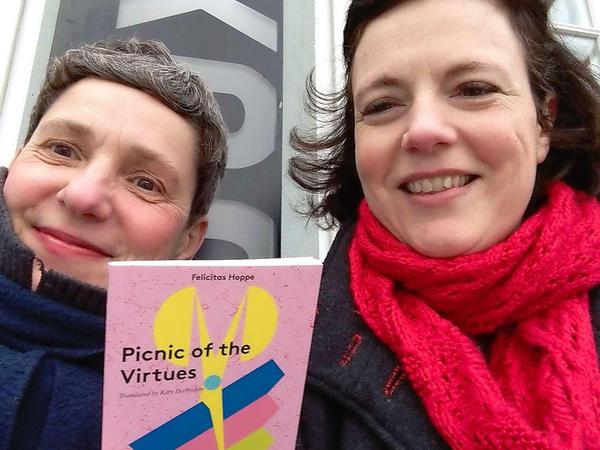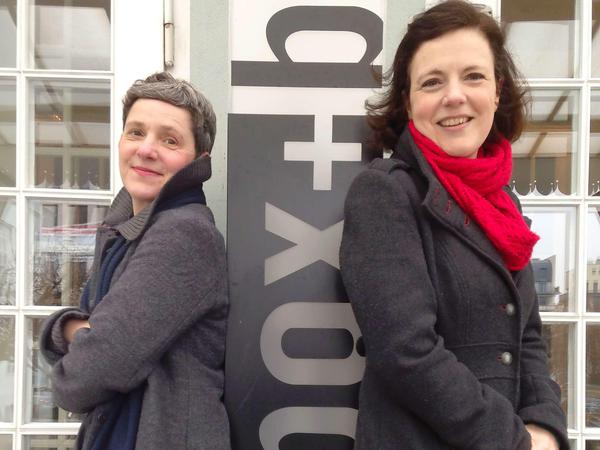
© Privat
Going Dutch with German Writers (15): Felicitas Hoppe and the Deutschlandfunk
Felicitas Hoppe is probably the most famous person Katy Derbyshire has ever had the pleasure to meet - and what a pleasure it was. The Büchner Award-winning writers talks trains, ships and piano lessons over white wine, completely distracting her interviewer from doing a professional job.
Who?
Felicitas Hoppe has written many books, all of them rather strange. The first was a collection of twenty miniature stories entitled Picknick der Friseure, and the most recent was what might be called a fictional autobiography, Hoppe. In 2012 she won the Georg Büchner Prize, which is probably Germany’s most prestigious literary award.
Where?
The bar in the Deutsches Theater
What?
White wine. They have two kinds: Riesling and Veltliner. Hoppe opts for Veltliner and I choose Riesling.
What did we talk about?
This is the first time I’ve met Felicitas Hoppe in person, although we’ve been corresponding for a while. So I’ve brought along a prop to help oil the conversation: a set of mini books including my brand new translation of five of the Picknick stories. We’re both very excited about the whole thing, not least because this is the first time Hoppe’s been published in book form in English. Which is a bit of an embarrassment for the English-speaking world, frankly. Some German writers get offended that British and American publishers don’t snap up their books, but Hoppe seems to have got used to the situation. Still, the teeny Picnic of the Virtues makes us very proud, and one or other of us keeps stroking it or righting the pile of books on the bar in front of us throughout the evening.
Hoppe tells me translation stories to begin with. She lived in Rome in the early nineties or late eighties, and her friend and landlady knew she wrote – although she wasn’t published back then. It’s thanks to her that Hoppe’s work has been published in Italy, and via a friend of hers in Turkey too, because she kept raving about her to everyone she knew. And now a man called Michel in France has translated the whole big fat Hoppe book simply because he loved it so much, and seems to have found a small publishing house to take it, and they’ll be reading together in Paris soon. I love the way translators make literature travel out of pure passion. Hoppe talks about a workshop she took part in with Chinese translators, where the end product was significantly longer than the original. Perhaps Chinese is just a very wordy language, she thought, but no – they had “added the missing information” in her stories to help Chinese readers understand. My skin crawls with embarrassment at the idea.
Hoppe is wearing a dress with very deep pockets, an apron-like affair as far as I can tell in the rather sparingly lit bar. She keeps pulling banknotes out of her pocket to pay for our wine. I think she enjoys the gesture. She tells me she does like a little luxury, even though she’s far from rich. She loves taking taxis, even for short trips, but in fact that’s much cheaper than having your own car. Travel – is she such an inveterate traveller as she seems? It was certainly hard to find a date for this evening because she seems to be jetting between Switzerland and the USA and who knows where else much of the time, although she lives around the corner. Well, travel is part of her job, it’s how she makes a living. She has to promote her books and earn money through readings and she can write wherever she is; she’s not one of those people who says, “The desk surface is all wrong – I can’t work like this!” Her accountant told her she did so much travelling last year it was almost implausible for the tax office. But it’s just work, not a luxury, and she’s not a “restless soul”. I tell her I am one of those “This desk surface is all wrong” people, and I found out the hard way when I did a four-week residency and missed my home comforts, and my daughter. Hoppe looks sympathetic.
Hoppe doesn’t get offended.

© Privat
A friend of mine is planning a round-the-world trip on a freight ship like she once did, only he’s going with his mother. How on earth did she deal with that, what was there to do? There was nothing to do, says Hoppe, except read and write and talk to sailors and eat three meals a day in the ship’s mess. You have to be the kind of person who can keep themself entertained. The ship stops off at various places but not for long – she had six hours in New York, for instance, which isn’t nearly enough. And she formed very deep friendships with the crew, but they were like holiday romances: they only worked on board, not in real life. Not that it was romantic in any way; the things they say about sailors aren’t true. I tell her about my one experience with sailors, on the ferry to Ireland when I was eighteen, when a Polish crewman let my friends and me sleep in his cabin – all totally innocent – and then invited us up to the bridge and showed us the stars. We both melt a tiny bit at the thought, I think.
The bar is fun. There’s a young crowd who are attending a play in the “box” theatre along the corridor, and they’re playing Bollywood hits on the sound system. The crowd comes flooding in during the interval and goes away again, then returns later on. It’s a bit like being on a very long train ride, with people getting on and off along the way. We’re the only people staying for the entire journey. Hoppe once went on what was called the “Literature Express” – a train trip for writers from Lisbon via Moscow to Berlin. That sounds weirdly familiar; I’m sure I read about a novel like that, in which a group of mediocre authors travels around Europe together. And yes, it turns out it is a novel, by the Georgian Lasha Bugadze, but I only work that out later. Hoppe doesn’t get offended that I’ve accidentally implied she’s a mediocre author. I assume she knows she’s not mediocre. Anyway, it was of course horrific, and while Hoppe was richly rewarded by the generous German funding body, many of the other writers were saving up their daily allowance to send to their families, and only eating at the buffets every evening. So they formed two groups: half of them would stand at the front and listen to the respective local mayor’s welcome speech while the other half went straight to the back and tucked into the sandwiches.
We go back to translation, or writing and translation. We’re drinking too much and bonding, not necessarily in that order. Felicitas often gets asked why she writes, which is a tricky question that a lot of writers hate. She doesn’t mind though because she still doesn’t know the answer. I talk about that sinking feeling when someone I’ve been getting on well with admits that they’re writing a novel. Everyone in Berlin seems to be writing a novel! I am not writing a novel, I assure Felicitas. Felicitas knows the problem. When she gets into conversation with taxi drivers they often tell her they want to write a novel. You experience so much in a taxi, you see. Felicitas always tells them to hurry up with it because hundreds of other taxi drivers have the exact same plan. And she laughs at me with my “Oh no, you’re not writing a novel, are you?” It’s worse than men who don’t take their socks off, she says. It very possibly is.
I don’t want to write a novel because translating instills too much respect in me for the writer’s art. I can’t imagine I could ever do it as well as the people I translate. But there are some translators who write too, and well, because they have the practical skills you need, the craftsmanship. Felicitas winces. She’s very fond of craftsmen – the Picknick stories are full of them – but it takes more than craftsmanship to write well. Does she say you need magic too? Maybe she does. She’s been writing since she was seven, she tells me, out of a desire to emulate the stories she read as a child. Her work has never been as good as what she wrote at primary school; every single story had an ending, even if it was “and then I woke up.” That need for emulation is what I have too! Only I want to emulate the exact story I’m reading, in my own language. And translation is something that never gets boring, because you never reach a plateau in your development.
Writers are probably braver than translators.

© Privat
It’s an impossible feat, of course, and this is one of my favourite theories but Felicitas hasn’t heard it before. Yes, it’s a bizarre idea that anyone could render a story exactly the same way in a different language, but then the whole idea of writing is equally ridiculous. I may be holding a bit of a lecture now. Because a writer can never know how her readers will interpret what she wrote. Is that scary? It is in a way, she says, because you never know who you’re addressing. Hoppe thinks writers are often very fearful people, and translators are much braver. I think writers are probably braver than translators. I’ve reached the point in the evening when I can’t explain why, though. Is it because translators are scared to express themselves through their work? Maybe. Felicitas translated Dr. Seuss’s classic Green Eggs and Ham. I am in awe. She says it was fun because she had to be very free to get all the rhymes. That seems like a brave way to translate to me. We’re reading together on the 19th and I ask her to bring Grünes Ei mit Speck along and read from that too.
I was supposed to ask Felicitas Hoppe about the current debate on writers’ social backgrounds. I don’t really feel like doing so because I’m very bored with the debate. I keep thinking I ought to but the wine is making me pointlessly rebellious. So I don’t know how she feels about German writers being doctors’ sons. She’s not a doctor’s daughter though. I can’t remember what her parents did for a living but she was one of five children, so they were poor. There were three bedrooms for the five of them and their mother would rotate them when they started arguing. But the single room wasn’t a bonus because that’s where the piano was. They used to share a piano lesson once a week between them – ten minutes each. So none of them are much good at playing the piano. She tells me she used to get up at six and listen to the radio for half an hour before she woke her brothers and sisters for school, although she isn’t the oldest. What did she listen to? Deutschlandfunk, always Deutschlandfunk, even now. I imagine a rather intense child with bright button eyes, listening to early-morning news programmes. Felicitas has amazing eyes, smallish and dark brown with the world’s best laughter lines. We’re smiling and laughing a lot.
Did we talk about magic? I think we did. We talked about magic numbers. People always think she was on the container ship for a year, because that’s how long they imagine it would take to go once around the world. Even after Jules Verne! But it only took four months really. A year is just a magical number, like all those numbers in fairy tales. I nod; I know exactly what she’s talking about and there’s no need to elaborate. She’s a Catholic and I’m an atheist, but I do believe in magic numbers, at least at this very moment. I recite my superstitious number rhyme for counting magpies, possibly slurring my words slightly because I feel a tiny bit embarrassed about reciting a magpie rhyme in the bar of the Deutsches Theater, but not because I’m sitting with an award-winning writer. She says she likes it.
The lovely girls behind the bar tell us it’s last orders but we’ve had too much already. Felicitas shows me where the rather swanky toilets are and we have a wobbly hug in the corridor. We tot up the amount we have drunk: 0.8 l of wine each! How very foolish. It has been fabulous, we assure each other, and it has. When I get home – wracked with guilt because I have yet again got drunk and failed to take any photos, which is incredibly unprofessional – an email comes from Felicitas Hoppe thanking me for the lovely evening. That’s what I usually do! I thank her back effusively and bewail my lack of professionalism. Luckily, she has time to go back the next day, although the bar is closed. So we pounce on a stranger, who takes a couple of snaps of us. Thanks!
Hangover?
I slept badly, thinking of things to write about Felicitas Hoppe. One of them was that she lived in a house made of cheese and opened the front door by cutting out a slice with an Opinel folding knife. But actually I’ve had worse hangovers; this one is just a mild and late-onset headache coupled with guilt.
- showPaywall:
- false
- isSubscriber:
- false
- isPaid:
- showPaywallPiano:
- false